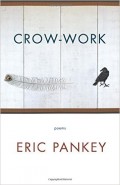
Book Review: Crow-Work by Eric Pankey

Crow-Work
Poems by Eric Pankey
Milkweed Editions, February 2015
ISBN-13: 978-1571314543
Ebook: 978-1571318848
$16, 88 pp.
Reviewed by Susan Thurston
In Crow-Work, award winning poet Eric Pankey offers poems that “swoop and veer.” Although he does not “tidy up the wreckage, the aftermath” from death and loss, he does something better, carrying us to a place where “(t)he in-held breath is released” (“Crow-Work”).
Like the titular bird, Pankey scavenges among a wide-sweep of references from the iconic to the personal, including the biblical Joseph and Judith, mythological Medusa and Venus, artistic masters Caravaggio and Bruegel, and especially a ghostly brother. In trim couplets and feather-light lines, he amasses enough glittering truth to illuminate even the darkest corners.
These lean and dark-winged poems make it clear that in “the realm of a poem only words are native” (“The Book of An Hour”). When he declares “you’re lost in an atom’s labyrinth” (“Spirit Figures”), we don’t want to flee, but instead trust him. Together, we twist even farther into the turns of life, following the sound of his voice through all that we encounter during our singular journeys. We find that together we can make sense of it. He is clear with us that living can be painful. But, as in “The Incredulity of Saint Thomas,”
One cannot set straight the past
Like a broken bone.
Enter the wound.
As if a spirit house,
As if a hallowed precinct.
Forego the thought
That one alters a space by occupying it.
One does not possess a wilderness.
One enters it.
Pankey turns his crow-like eye upon the human world, the wasteland of it all, from the high roost of mature perspective. His distilled phrasing and staccato punctuations underscore his keen and vital declarations. This collection enriches Pankey’s already substantive list and makes it clear to us:
The past like a poem, I’ve come to learn,
Does not change,
but around it language does. (“Dark Was the Night”)
Susan Thurston writes poetry and prose, with award-winning work published in numerous periodicals and anthologies including The Writer’s Almanac with Garrison Keillor (American Public Media), Low Down and Coming On (Red Dragonfly Press, 2010), and Open to Interpretation: Water’s Edge (Taylor & O’Neill, 2012). In her novel Sister of Grendel (The Black Hat Press, 2016) she weaves a reconstruction of the Beowulf myth. In addition to LAR, her reviews have also appeared in the Minneapolis Star Tribune. She writes about books, writing, and more books at www.susanthurstonwrites.com.

Leave a Reply